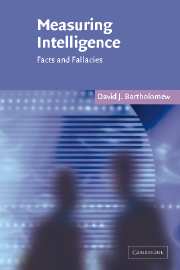Book contents
- Frontmatter
- Contents
- List of figures
- Preface
- Acknowledgement
- 1 The great intelligence debate: science or ideology?
- 2 Origins
- 3 The end of IQ?
- 4 First steps to g
- 5 Secons steps to g
- 6 Extracting g
- 7 Factor analysis or principal components analysis?
- 8 One intelligence or many?
- 9 The Bell Curve: facts, fallacies and speculations
- 10 What is g?
- 11 Are some groups more intelligent than others?
- 12 Is intelligence inherited?
- 13 Facts and fallacies
- Notes
- References
- Index
7 - Factor analysis or principal components analysis?
Published online by Cambridge University Press: 22 September 2009
- Frontmatter
- Contents
- List of figures
- Preface
- Acknowledgement
- 1 The great intelligence debate: science or ideology?
- 2 Origins
- 3 The end of IQ?
- 4 First steps to g
- 5 Secons steps to g
- 6 Extracting g
- 7 Factor analysis or principal components analysis?
- 8 One intelligence or many?
- 9 The Bell Curve: facts, fallacies and speculations
- 10 What is g?
- 11 Are some groups more intelligent than others?
- 12 Is intelligence inherited?
- 13 Facts and fallacies
- Notes
- References
- Index
Summary
What is principal components analysis?
This chapter is a digression to look at a competitor to factor analysis. It is a competitor in much the same sense as the baby cuckoo in the nest. To many people it looks much the same but it is actually a different kind of animal. The confusion between the two methods arises from the numerical similarities. In both, the input consists of correlation coefficients and the output is in much the same form. In fact, at least one of the major software packages treats principal components analysis as one of several versions of factor analysis, and so the output comes in exactly the same form. Yet, conceptually, there are fundamental differences.
So what is principal components analysis (hereafter, PCA) and why is it relevant to intelligence testing? It is a method which yields an index, not unlike an IQ measure, which is a weighted average of test scores. What makes it special is the way in which the weights are chosen. It goes farther than the typical method of constructing an IQ measure in that the weights are determined by the data and not prescribed in advance. The idea is as follows. If all the test scores are indicators of ‘intelligence’, they will vary, partly because the individuals on which they were measured vary in intelligence, and partly for other reasons irrelevant to the main object. The object is to find a measure which discriminates as effectively as possible between individuals of differing intelligence.
- Type
- Chapter
- Information
- Measuring IntelligenceFacts and Fallacies, pp. 68 - 73Publisher: Cambridge University PressPrint publication year: 2004



